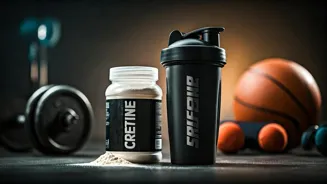Protein: The Building Block
Protein powder is, without a doubt, a cornerstone in the fitness realm. Its primary function is to aid muscle repair and growth, making it essential for
individuals looking to build muscle mass or recover after intense workouts. This supplement is derived from various sources, including whey, casein (both from milk), soy, and even plant-based options like pea or rice protein. This variety caters to different dietary needs and preferences. Protein powder provides a concentrated dose of amino acids, the building blocks of protein, which are necessary for numerous bodily functions, including enzyme and hormone production. The speed at which your body absorbs protein can vary depending on the source. For example, whey protein is quickly absorbed, making it suitable for post-workout consumption, while casein is digested more slowly, ideal for sustained release over several hours, often taken before bed.
Creatine: Energy Amplifier
Creatine, on the other hand, works differently. It is a naturally occurring compound found in the muscles and is involved in energy production during high-intensity exercise. The primary effect of creatine supplementation is to increase the availability of phosphocreatine (PCr) in your muscles. PCr acts as a rapid energy reserve, fueling short bursts of intense activity, such as weightlifting or sprinting. Consequently, supplementing with creatine can lead to increases in strength, power, and muscle mass. It also helps in hydrating muscle cells, making them appear fuller. Unlike protein, which is a direct muscle builder, creatine enhances your body's capacity to perform intense workouts, indirectly supporting muscle growth through increased training capacity. Its benefits extend beyond just athletes; creatine can improve cognitive function and muscle strength in older adults. The supplement is often taken as a powder and can be mixed with water or juice.
Comparing the Two
The key difference lies in their mechanisms. Protein powder primarily provides the necessary building blocks for muscle tissue repair and growth. Creatine boosts the body's energy system, helping to increase strength and power output during workouts. Creatine is often compared to protein powder because both are frequently used for muscle growth, but they contribute through separate pathways. Protein provides the materials for building, whereas creatine improves the engine's performance. Both can be used together because they support muscle growth in complementary ways. Athletes often use both to maximize their potential. Protein intake is generally recommended for anyone engaged in regular physical activity. Creatine is particularly useful for those performing high-intensity, short-duration exercises where power is a key factor. If your goal is to build muscle, both creatine and protein can be valuable additions to your regimen. If your focus is solely on endurance activities, then protein powder might suffice.
Choosing the Right Supplement
The best choice for you depends on your specific fitness goals and training style. If your workouts are geared toward resistance training, body building, or high-intensity interval training (HIIT), creatine could be an excellent option, as it provides the energy required for peak performance. If you're looking to recover faster after workouts, or if you're aiming to increase muscle mass, protein powder is essential. Your dietary habits should also be considered. Protein powder becomes more crucial if you struggle to consume enough protein from whole food sources like meat, eggs, or beans. Many people use both supplements in conjunction. Always consider your overall diet. Supplements are designed to augment, not replace, a balanced eating plan. Before starting any new supplement, consult a healthcare professional, especially if you have existing medical conditions.












